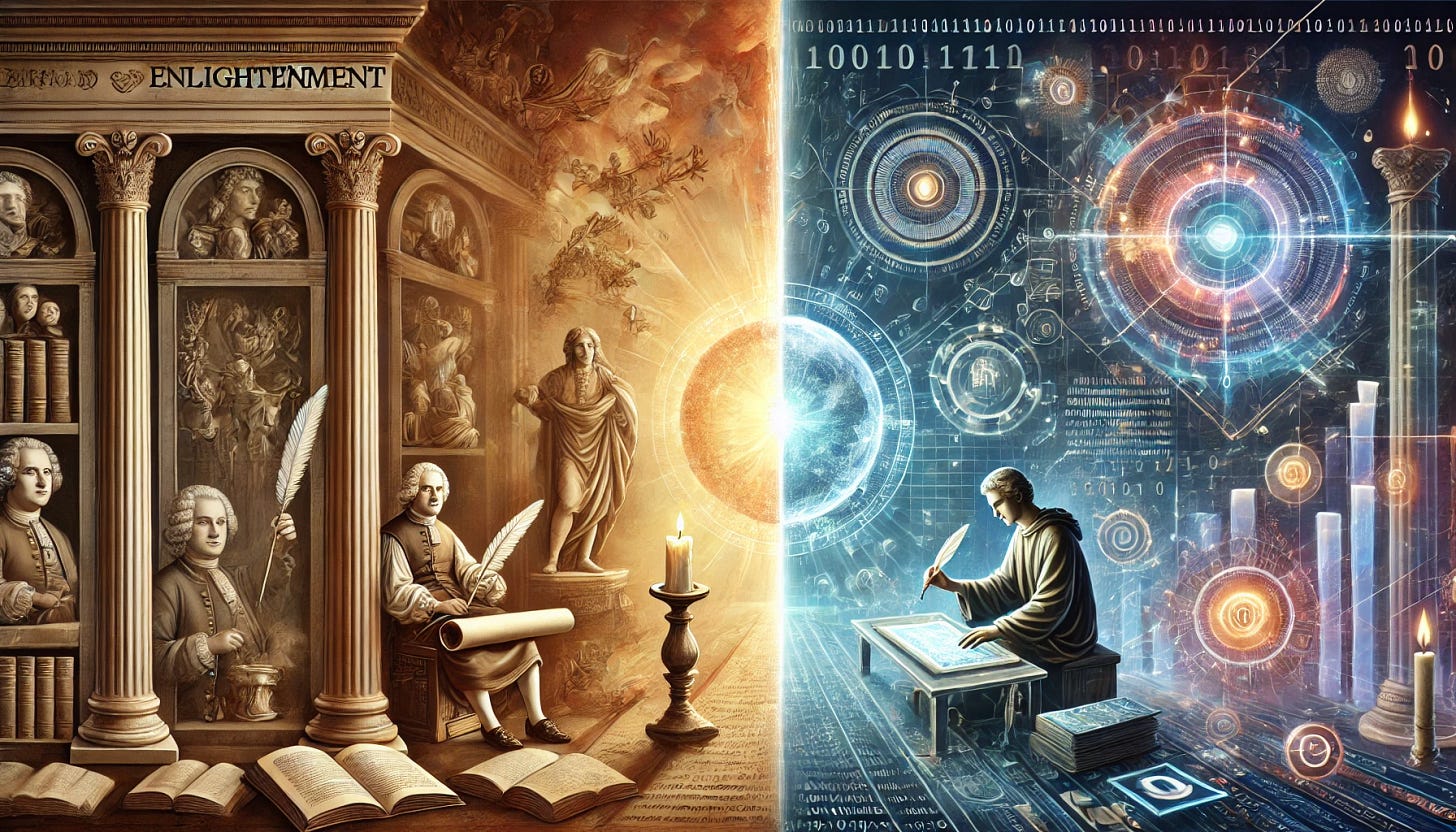The Evolution of Enlightenment:
From the Age of Reason to the Digital Age
Introduction: The Pursuit of Enlightenment
Enlightenment has long been regarded as one of the highest goals of human existence—a state where reason, knowledge, and wisdom converge to elevate the human spirit. Traditionally associated with the philosophical and intellectual movement of the 17th and 18th centuries, enlightenment has evolved over time, adapting to the needs and challenges of each new era. As we move further into the 21st century, the concept of enlightenment takes on new dimensions, shaped by the rapid advancements in technology, the accessibility of information, and the complex interplay between human intellect and artificial intelligence.
The Historical Roots of Enlightenment
The Enlightenment, also known as the Age of Reason, was a period in European history that spanned the late 17th to the 18th century. It was characterized by an emphasis on reason, science, and intellectual discourse, with a focus on challenging traditional authorities, such as the monarchy and the church. Thinkers like Immanuel Kant, Voltaire, John Locke, and Jean-Jacques Rousseau championed the idea that human beings could improve society through rational thought, empirical evidence, and the pursuit of knowledge.
This period gave rise to many of the democratic principles and scientific advancements that form the foundation of modern Western society. The Enlightenment's emphasis on individual rights, freedom of speech, and the separation of church and state paved the way for the development of modern democracies and the advancement of human rights.
Enlightenment in the Modern Era: The Information Age
As we transitioned from the Age of Reason into the Industrial Revolution and beyond, the concept of enlightenment evolved to encompass new challenges and opportunities. The 20th century brought unprecedented technological advancements, leading to an explosion of information and a global interconnectedness that was previously unimaginable.
In the 21st century, we find ourselves in the midst of the Information Age—a period defined by the rapid proliferation of digital technology, the internet, and artificial intelligence. In this context, enlightenment is no longer just about the pursuit of knowledge and reason; it is about navigating an overwhelming sea of information, discerning truth from falsehood, and using technology to enhance, rather than diminish, human intellect.
Intellectual Enlightenment in the 21st Century
To be intellectually enlightened in the 21st century means much more than just possessing knowledge. It involves a dynamic interplay between critical thinking, ethical considerations, and technological fluency. Here are the key components of modern intellectual enlightenment:
Critical Thinking and Reasoning:
In a world saturated with information, the ability to think critically and reason logically is more important than ever. Intellectual enlightenment requires individuals to question assumptions, evaluate evidence, and consider multiple perspectives before drawing conclusions. This level of discernment is essential for navigating the complexities of the modern world.
Digital Literacy and Technological Fluency:
The Information Age demands a new kind of literacy—digital literacy. Being intellectually enlightened today means understanding how digital tools work, how data is collected and used, and how to leverage technology to enhance one's knowledge and creativity. This also involves being aware of the ethical implications of technology, including issues of privacy, security, and the potential for AI to both aid and disrupt human society.
Ethical Awareness and Social Responsibility:
Enlightenment in the 21st century is not just about individual growth; it is also about contributing to the greater good. This involves a deep awareness of the social, political, and environmental challenges facing the world, and a commitment to using one's knowledge and skills to address these issues. Intellectual enlightenment today requires a balance between personal advancement and social responsibility.
Adaptability and Lifelong Learning:
The rapid pace of technological change means that the knowledge and skills required for enlightenment are constantly evolving. To remain intellectually enlightened, individuals must embrace lifelong learning and be willing to adapt to new information, technologies, and paradigms. This adaptability is key to thriving in an era of constant change.
Collaboration and Collective Intelligence:
Enlightenment is no longer a solitary pursuit. The interconnectedness of the modern world means that collaboration and collective intelligence are essential for solving complex problems. Intellectual enlightenment today involves working with others, sharing knowledge, and contributing to the global flow of ideas.
Mindfulness and Mental Well-being:
The pressures of the digital age can be overwhelming, making mindfulness and mental well-being critical components of intellectual enlightenment. An enlightened individual in the 21st century is one who can balance the demands of the modern world with a focus on inner peace, emotional intelligence, and mental resilience.
The Path Forward: Embracing Enlightenment in the Digital Age
As we move further into the 21st century, the concept of enlightenment will continue to evolve, shaped by the ongoing interplay between human intellect and technological innovation. To achieve intellectual enlightenment in this era, we must embrace the opportunities offered by technology while remaining vigilant against its potential pitfalls.
This requires a commitment to continuous learning, ethical reflection, and a deep understanding of the world around us. By doing so, we can ensure that the pursuit of enlightenment remains a guiding force in our lives, helping us to navigate the complexities of the modern world and contribute to the creation of a more just, informed, and enlightened society.



